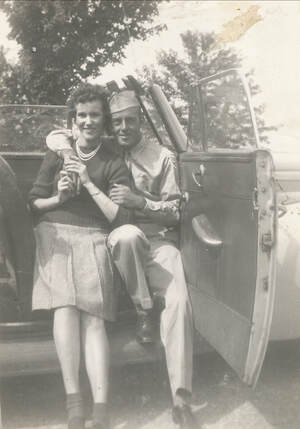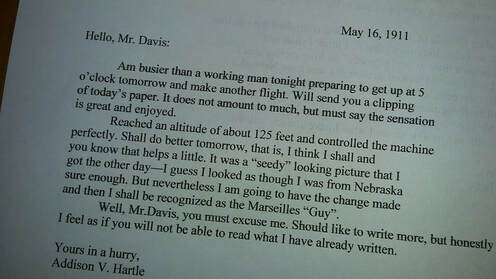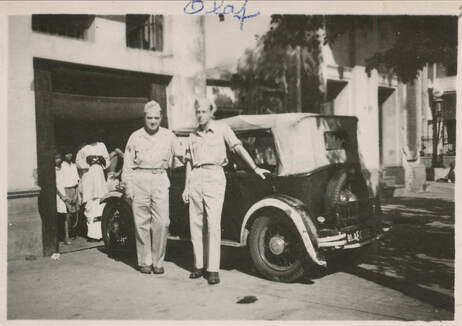|
Personal letters and journals are critical to writing nonfiction historical accounts and historical novels. Plot lines in my novel, Yours in a Hurry, advance through letters shared among the main characters. Readers ask if they are actual letters or fictional. Spoiler alert: Only the one written by Addison the day before his death is an actual letter, which survives because Mr. Davis to whom he wrote it back home shared it with the local newspaper at the time.  Edith Hartle and Olaf (Tom) Darnell, 1942 Edith Hartle and Olaf (Tom) Darnell, 1942 Windows to the Past A current project with the working title Little Diamonds is set in the period immediately following WWI. I needed detailed descriptions of a soldier on the front in France for two of the characters. Although I read extensively and had visited some WWI battlefields during our World War II tour of Europe (see also the categories list at the left for additional WWI stories), I must single out one book, Hell’s Observers, as especially helpful. The well reproduced journal, which I found at an antique show, of William J. Graham of the American Expeditionary Force provided not only the information I needed, but the extensive WWI photograph collection of one of the authors, Bruce A. Jarvis, greatly enhances the story’s locations and characters. Now I’m reflecting on my father’s WWII letters to my mother, his then-fiancé. It’s so emotional to read ancestors’ words when they were young and had their lives before them. We know how things turned out, but back then the letters were about mundane daily happenings at camp or what was happening back home in Marion, Ohio. I often wonder if that’s on purpose, to take their minds off of the terrible possibilities facing them. A typical letter from my father provides an example. He is a clerk and driver of materials to Post Exchanges (referred to as a PX) down South at the time. The men in mom and dad’s families were all employed by the railroad, and mom loved writing letters and collecting pens, so he engages her in a discussion of both in this letter from January 1944. “…In the Jan 15 post magazine there is an article on an army railroad. You should read it. This railroad runs from Camp Polk to Camp Claiborne, La. I go to both camps often and see the railroad. It tells pretty well what these swamps are like. Wild hogs come around the mess kitchens. I’ve seen twenty at a time at ours. They always dig pits for garbage and about every day someone has to help a hog out of the pit they go in for a meal and can’t climb out… …Yesterday I got an Eversharp pen…Has the solid gold head on it, you’ve seen them. …losing a pen every time I turn around but going to keep track of this one. Maybe. The one of yours has paid for itself a thousand times any way if it does stop now. This pen isn’t as good as the Parker I had. Maybe all right after I use it a while. This pen sells for 10.00 cost 5.50 in the PX. Everything is cheaper. That identification of yours is from the PX even, six dollars but I think it is good silver…” Later in the war, the topics changed to concerns about how many “points” were needed to get into the queue to go home. Selective Memories Some veterans published their stories. Poignant examples are memoirs With the Old Breed: At Peleliu and Okinawa by Eugene Sledge and Helmet for My Pillow by Robert Leckie. Both contributed to the miniseries The Pacific, which has given me insights to the dynamics of the American and Japanese conflict in which my dad participated. Other children and grandchildren of WWII veterans are following the same journey as me, and some are publishing their letters and journals. If you’d like to see two recent examples, Michele Makros and Kara Martinelli have written books based on their father’s and grandfather’s service, respectively. I met Kara several years ago at an author talk and signing for her book, My Very Dearest Anna: My Grandparents’ Letters From WWII. She encouraged me to do something with my dad’s letters even though most, especially early in the war, are so highly censored that they provide little information other than where he was stationed. Michele’s recent book, Love Letters from the Marine Wolf, is visually beautiful and includes details of her family’s war time home life in addition to her father’s service as a member of the Army Transportation Corps in WWII. She also met with many of his surviving shipmates and includes their stories as well. Michele introduced me to the Center of American War Letters, where one can download letters and photos that families have submitted. Did anyone in your family leave a journal or letters that give you insight to their life that you might not have otherwise had? If so, I and other readers would love to hear about them. You can respond on this web page or by email at [email protected]. Ann Otto writes fiction based on factual as well as oral history. Her debut novel, Yours in a Hurry, about Ohioans relocating to California in the 1910’s, is available online at Amazon, Barnes & Noble, and Kindle. Her academic background is in history, English, and behavioral science, and she has published in academic and professional journals. She enjoys speaking with groups about all things history, writing, and the events, locations, and characters from Yours in a Hurry and her current projects, which include a novel about Ohio’s Appalachia in the 1920’s and a compilation of her father’s World War 2 letters. She blogs about history and writing and can be reached through the website, https://www.ann-otto.com/ , or at Facebook@Annottoauthor and www.Goodreads.com
0 Comments
Leave a Reply. |
Archives
August 2020
Categories
All
|


 RSS Feed
RSS Feed